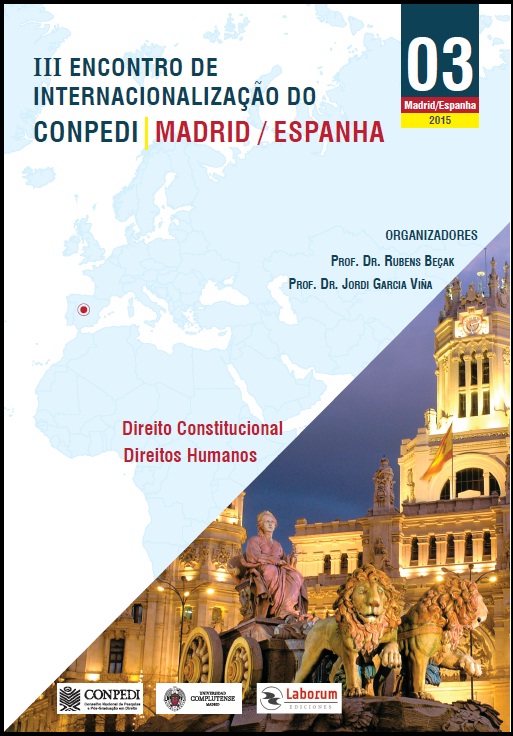O Exercício Fraterno das Identidades de Gênero: A Transexualidade para Além da Liberdade e da Igualdade
Conteúdo do artigo principal
Resumo
Downloads
Detalhes do artigo
Autores que publicam nesta revista concordam com os seguintes termos:
O(s) autor(es) autoriza(m) a publicação do texto na da revista;
O(s) autor(es) garantem que a contribuição é original e inédita e que não está em processo de avaliação em outra(s) revista(s);
A revista não se responsabiliza pelas opiniões, idéias e conceitos emitidos nos textos, por serem de inteira responsabilidade de seu(s) autor(es);
É reservado aos editores o direito de proceder a ajustes textuais e de adequação às normas da publicação.
Autores mantém os direitos autorais e concedem à revista o direito de primeira publicação, com o trabalho simultaneamente licenciado sob a Licença Creative Commons Attribution que permite o compartilhamento do trabalho com reconhecimento da autoria e publicação inicial nesta revista.
Autores têm autorização para assumir contratos adicionais separadamente, para distribuição não-exclusiva da versão do trabalho publicada nesta revista (ex.: publicar em repositório institucional ou como capítulo de livro), com reconhecimento de autoria e publicação inicial nesta revista.
Autores têm permissão e são estimulados a publicar e distribuir seu trabalho online (ex.: em repositórios institucionais ou na sua página pessoal) a qualquer ponto antes ou durante o processo editorial, já que isso pode gerar alterações produtivas, bem como aumentar o impacto e a citação do trabalho publicado (Veja O Efeito do Acesso Livre) emhttp://opcit.eprints.org/oacitation-biblio.html
Referências
BAGGIO, Antônio Maria (Org). O Princípio esquecido. Trad. Durval Cordas, Iolanda Gaspar, José Maria Almeida. Vargem Grande Paulista, São Paulo: Cidade Nova, 2008, Vol. 1.
BUTLER, Judith. Bodies that matter: on the discursive limits of sex. New York/London: Routledge, 1993.
______. Criticamente subversiva. In: JIMENEZ, Rafael M. Mérida. (ed.) Sexualidades transgressoras: uma antologia de estudos queer. Barcelona: Icaria, 2002.
BENTO, Berenice Alves de Melo. O que é transexualidade? São Paulo: Brasiliense, 2008.
______. Na escola se aprende que a diferença faz a diferença. Ed. Rev. Estud. Fem. [online]. 2011, vol.19, n.2, pp. 549-559. ISSN 0104-026X. Disponível em
______. A (re)invenção do corpo: sexualidade e gênero na experiência transexual. Rio de Janeiro: Garamond/Clam, 2006.
BOBBIO, Norberto. A era dos direitos. Rio de Janeiro: Elsevier, 2004.
CRUZ, Maria Helena. Percursos, Barreiras e Desafios de Estudantes Universitários de Camadas Populares no ensino Superior na UFS/Sergipe/Brasil (2008). In: Gênero e Trabalho: diversidade de experiências em educação e comunidades tradicionais. Organizadoras: Maria do Rosário de Fátima Andrade Leitão e Maria Helena Santana Cruz. Florianópolis: Ed. Mulheres, 2012.
DOUZINAS, Costas. O fim dos direitos humanos. Trad. Luzia Araújo. São Leopoldo: Unisinos, 2009.
DE SÁ NETO, Clarindo Epaminondas; GURGEL, Yara Maria Pereira. Caminhando entre a (in) visibilidade: uma análise jurídica sobre o projeto de lei nº5.012/2013 – Lei de Identidade de Gênero. Revista Direito e Liberdade – Escola da Magistratura do Rio Grande do Norte. V. 16. n. 1. p. 55-72.
ESQUEMBRE VALDÉS, María del Mar. Ciudadanía y Género Una Reconstrucción de la tríada de derechos fundamentales. In: Género y Derechos Fundamentales. Cristina Monereo Atiebza; José Luis Monereo (Directores y Coordinadores). Granada (España): Comares, 2010.
Farrer, Peter. D’Eon de Beaumont, New Facts, Or Fiction. GENDYS 2002, The Seventh International Gender Dysphoria Conference, Manchester England, 2002.
FOUCALT, Michel. História da sexualidade. A vontade de saber. Rio de Janeiro: Graal, 2008. Vol. 1.
FRIEDLI, Lynne. Mulheres que se faziam passar por homens: um estudo das fronteiras entre os gêneros o século XVIII. In: ROUSSEAU, G. S; PORTER, Roy (orgs.) Submundos do sexo no iluminismo. Rio de Janeiro: Rocco, 1999.
HOBSBAWM, Eric. A revolução francesa. Trad. Maria Tereza Lopes e Marcos Penchel. Rio de Janeiro: Paz e Terra, 1996.
LAQUEUR, Thomas. Inventando o sexo: corpo e gênero dos gregos a Freud. Rio de Janeiro: Relume Dumará, 2001.
MARCEL, Gabriel. Creative Fidelity. Trad. R. Rosthal. Nova York: Farrar, Strauss & Co, 1964.
MOLINA PETIT, C. Debates sobre el género. In: C. Amorós (ed): Feminino y filosofía. Thémata, Síntesis, Madrid, 2000.
MORIN, Edgar. L´esprit du Temps. Paris: Grasset, 1962.
MORIN, Edgar; KERN, A. B. Terra-Pátria. 5.ed. Porto Alegre: Sulina, 2005.
NICKNICH, Monica. A fraternidade como valor orientativo dos novos direitos na pós-modernidade. In: VERONESE, Josiane Rose Petry; OLIVEIRA, Olga Maria Boschi Aguiar de. Direitos na Pós-modernidade: a fraternidade em questão. Florianópolis:
Fundação Boiteux, 2011, parte I.
OLIVEIRA, Olga Maria Boschi Aguiar de. O princípio da fraternidade nas revoluções moderna e contemporânea. In: VERONESE, Josiane Rose Petry; OLIVEIRA, Olga Maria Boschi Aguiar de. Direitos na Pós-modernidade: a fraternidade em questão. Florianópolis: Fundação Boiteux, 2011, parte I.
PRECIADO, Beatriz. Manifiesto contra-sexual: prácticas subversivas de identidad sexual. Madrid: Pensamiento Opera Prima, 2002.
ROUSSEAU, Jean Jacques. Emílio ou Da Educação. Tradução Roberto Leal Ferreria. 4a.ed. São Paulo: Martins Fontes, 2014.
WARAT, Luis Alberto. A Fantasia Jurídica da igualdade: Democracia e Direitos Humanos numa pragmática da singularidade. In: Revista Sequência, nº 24, set./1992, Florianópolis, SC.





